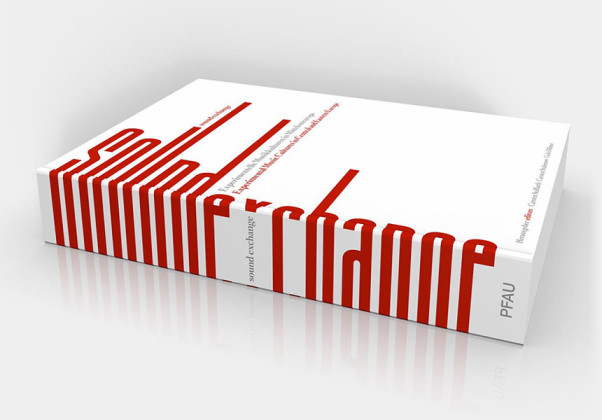Sound Exchange: Anthology of Experimental Music Cultures in Central and Eastern Europe 1950-2010 (2012) [English/German]
Filed under book | Tags: · central europe, czech republic, east-central europe, eastern europe, electroacoustic music, electronic music, estonia, experimental music, germany, hungary, latvia, lithuania, music, music history, poland, radio art, slovakia, sound art, sound recording

“The long traditions of experimental music cultures in Central and Eastern Europe are diverse and multifaceted, but have been difficult to access until now. With contributions from selected music, media and cultural studies specialists from eight countries, this anthology bundles together elements of unearthing material locally and documents current positions and historical finds by protagonists, as well as musical aesthetic qualities in the history of musical experiments in Central and Eastern Europe. The anthology pursues commonalities and singularities and discusses their relationship with the international history of experimental music.
The often barely known musical and artistic positions portrayed here show a wide stylistic and aesthetic spectrum of electro-acoustic music, composed and improvised music, musical media art and audio art from 60 years of experimental musical culture in the context of decades-long political repression and an atmosphere of increasing openness and international networking following 1989.”
With contributions by Antoni Beksiak, Balázs Kovács, Daiga Mazvērsīte, Gerhard Lock, Hans-Gunter Lock, Māra Traumane, Martin Flašar, Michal Rataj, Miloš Vojtěchovský, Monika Pasiecznik, Pavel Klusák, Slávo Krekovič, Tautvydas Bajarkevicius, Viestarts Gailītis.
Edited by Carsten Seiffarth, Carsten Stabenow, and Golo Föllmer
Publisher PFAU, Saarbrücken, 2012
ISBN 9783897274877, 3897274876
400 pages
PDF (20 MB, added on 2019-1-25, via book website)
HTML (updated on 2019-1-31)
Gábor Hushegyi, Zsolt Sőrés: Transart Communication: Performance & Multimedia Art Studio erté 1987-2007 (2008) [English, Slovak, Hungarian]
Filed under book | Tags: · 1980s, 1990s, 2000s, art, art history, east-central europe, hungary, multimedia, performance, performance art, slovakia

“Monografia dokumentuje dvadsaťročnú činnosť legendárneho umeleckého združenia Štúdio erté v anglickom, slovenskom a maďarskom jazyku. Skupinu založili József R. Juhász, Ilona Németh, Ottó Mészáros a Attila Simon v roku 1987 v Nových Zámkoch. Počas svojho pôsobenia sa združenie preslávilo organizovaním festivalov alternatívneho, experimentálneho a multimediálneho umenia, umením performancie, výstavnou, ale aj edičnou a edukačnou činnosťou. Aktivity zoskupenia nie je možné vnímať mimo spoločensko-politického kontextu strednej Európy v 80. a 90. rokoch minulého storočia. Práve spoločenská realita totalitného systému a menšinového geta boli príčinou ich vzniku. Činnosť skupiny v knihe priblížia texty Gábora Hushegyiho a Zsolta Sőrésa a rozsiahla obrazová dokumentácia.”
Edited by Gábor Hushegyi, József R. Juhász, Ilona Németh
Publisher Kalligram, Bratislava, 2008
ISBN 8071499757
296 pages
Transart Communication on Monoskop wiki
Jozsef R. Juhász on Monoskop wiki
performance art in Slovakia on Monoskop wiki
PDF (17 MB, updated on 2021-11-4)
Comment (0)Robert T. Holt: Radio Free Europe (1958)
Filed under book | Tags: · bulgaria, central europe, communism, czechoslovakia, history, hungary, mass media, poland, politics, propaganda, public broadcasting, radio, romania, southeastern europe

What is radio Free Europe? Where does it broadcast? Who runs it? What are its purposes? Although thousands of Americans are familiar with Radio Free Europe (many have contributed to its support through the Crusade for Freedom campaigns), few know enough about its background to answer these and similar questions. In this book a political scientist with first-hand knowledge gives a detailed account of the organization and development of this unique propaganda enterprise.
Radio Free Europe was established as a private broadcasting project in 1949 by the Free Europe Committee, headed by Joseph C. Grew, as part of the Committee’s program of broad, long-range assistance to democratic exiles from totalitarian countries. The operational headquarters are located at Munich, and the broadcasts are directed to the people of five satellite countries: Czechoslovakia, Hungary, Romania, Bulgaria, and Poland.
Professor Holt tells how Radio Free Europe was established, outlines its basic policies and objectives, describes its organization, personnel, programming, and services, discusses transmission problems, and examines the effectiveness of the propaganda. He describes in detail the role of RFE in connection with the uprisings in Poland and Hungary and analyzes the charges that RFE stimulated the Hungarian revolt.
Publisher University of Minnesota Press, 1958
ISBN 978-0-8166-5788-9
249 pages

